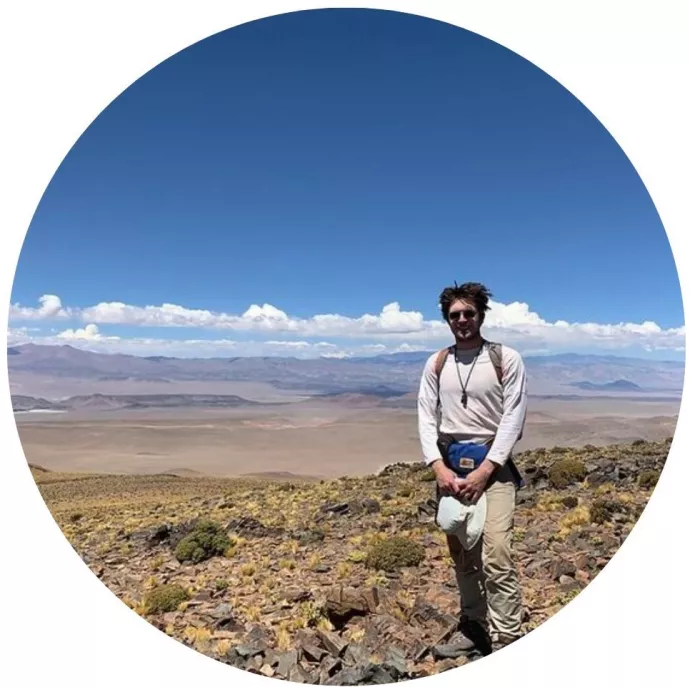
CPS Grad Spotlight - Mitchell McMillan
Name: Mitchell McMillan
MSc or PhD Candidate: PhD Candidate
Location of Undergraduate Education:
B.Sc. in Geology, University of Alabama
Name of the Lab at CPS: Schoenbohm Lab
Selected Awards:
CPS Best Paper Award (2020)
Selected Research Contributions: https://scholar.google.com/citations?user=W-ds-7wAAAAJ&hl=en
Mitchell, please tell us about yourself and your journey as a PhD Candidate!
How did you come to UTM? What interested you to join a lab here?
I came to UTM to do research with Lindsay Schoenbohm, my PhD supervisor. I was familiar with Lindsay’s research in the Central Andes of Argentina, especially her papers on how deep lithosphere dynamics may control mountain building and the construction of orogenic plateaus. It was a perfect opportunity to get some international field experience while working on a really interesting topic.
When did you realize that you wanted to pursue a graduate study?
After completing my BSc, I wasn’t immediately sure what to do. I worked for 1 year in industry, and while I enjoyed the work I was given, I became more interested in pursuing new ideas. I decided to get a Master’s degree, but I still wasn’t sure if academic research was for me. As I learned more about academia while obtaining my MSc, I finally decided to go for the PhD.
What are your research interests? Tell us few exciting things about your research.
I’m most interested in how tectonics, climate, and lithology interact to shape Earth’s surface. While lots of amazing work has been done on, e.g., feedbacks between river or glacier erosion and tectonic uplift, there are major landscapes where these ideas aren’t applicable, such as arid plateaus (not to mention entire planets, like Mars). My interest in explaining Earth’s surface led me to try to understand these landscapes. One exciting part of this was discovering that an entire landscape was carved by wind erosion over ca. 10 million years.
What is your goal when you finish your degree?
I will be working as a postdoc at Georgia Tech. My goal is to expand on my numerical modelling skills so that I can tackle questions of how subducted aqueous fluids react with the upper plate, especially in the lower crust. Metamorphic reactions driven by hydration affects things like mountain building, the average composition of Earth’s crust, and deep carbon cycling. My current focus is the idea that aqueous fluids and high pressure can transform metastable mineral assemblages (basalt or granulite) into more dense assemblages (eclogite). The dense eclogite may then become gravitationally unstable and founder into the mantle, leaving behind a felsic crust and potentially an orogenic plateau.
What are some of your achievements you'd like to share?
Receiving the CPS Best Paper Award in 2020 was an amazing honor, because the grad students in our department all do really interesting and important research. Defending my PhD in a (somewhat) timely manner feels like an achievement as well.
Do you have any advice for students considering to pursue graduate studies in research?
I’m probably the last person that should be giving advice. But I picked up a few ideas during the course of my PhD that helped me, so they may be of some help to other students. The first one is fallibilism – the idea that all knowledge, including all the existing research in your field, is fallible. Shortcomings or errors in scientific theories are therefore to be expected as the rule, not the exception. This helped me, because it means that any existing explanation (or theory) can be improved by finding and solving problems in it. Solving what seems like a small problem will often lead to several deeper, more interesting problems. This freed me up from worrying that I would eventually run out of ideas to research. It also reduced my fears of writing something in a paper that could later turn out to be wrong. In fact, all papers contain errors or are wrong in some way; this is also to be expected given that knowledge is fallible. Problems and errors are opportunities for future research. The second helpful idea is that problem solving is fun. Since scientific research is problem solving, it can also be fun. To be sure, it can also be dull or stressful or frustrating. I’m learning to focus on the fun aspects of solving problems as a way to do better research. This idea encompasses everything from reading the literature (answering questions that come as you read) to performing the research methods (testing equipment, writing software) to writing the final paper (solving the problem of how to convey complicated ideas persuasively).
